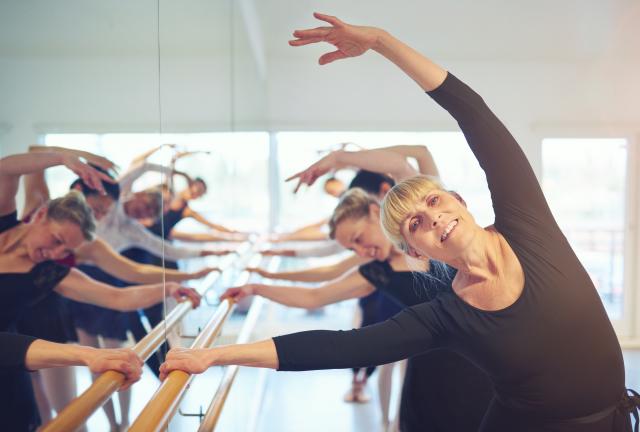Ballet is a dance form that has been around for centuries and is typically associated with young, agile dancers who have trained for years to perfect their craft. However, ballet is not just for the young, as it can be enjoyed by people of all ages, including those over the age of 50, says Angelika Burroughs, a former Ukrainian professional ballerina, who created FitBarre-fitness for adults based on ballet more than ten years ago when she was living in Sydney. Now living in Noosa, FitBarre has become a popular choice for young and old, male and female to help them stay fit, healthy and happy.
“I have an amazing 83 year young gentleman in my class who moves like a professional dancer 30 years his junior. I have ladies who have improved their posture so much that they are standing straight and aligned for the first time in years,” she said.
Angelika said practicing ballet can have numerous health benefits for individuals in this age group, both physically and mentally and she has outlined the benefits below.
Physical Benefits:
Improved Balance and Coordination
As we age, our balance and coordination can decline, making us more prone to falls and other accidents. Ballet training involves a great deal of balance and coordination work, which can help improve these skills over time. As you progress in your training, you’ll find that you’re better able to maintain your balance and execute movements with greater precision.
Increased Flexibility and Range of Motion
Flexibility and range of motion can also decline as we age, making it more difficult to perform everyday tasks and activities. Ballet involves a lot of stretching and movement that can help increase your flexibility and range of motion, improving your overall physical functioning. Additionally, ballet can help alleviate joint pain and stiffness, making it easier to move your body.
Stronger Muscles and Bones
Regular ballet practice can also help build stronger muscles and bones. Ballet involves a lot of weight-bearing exercise, which is essential for building and maintaining bone density. Additionally, the repetitive movements and isometric contractions of ballet help to build and tone muscles, increasing overall strength and endurance.
Improved Cardiovascular Health
Ballet is a form of aerobic exercise, which means that it can help improve your cardiovascular health. Aerobic exercise increases your heart rate and breathing rate, improving the flow of oxygen and blood to your muscles and organs. Over time, this can lead to improved cardiovascular endurance and overall health.
Mental Benefits
Improved Cognitive Function
Research has shown that dance can help improve cognitive function, including memory, attention, and decision-making. This is because dance requires the brain to constantly make new connections between different parts of the body, improving overall neural plasticity. Ballet, in particular, requires a great deal of mental focus and concentration, which can help keep your brain sharp and engaged as you age.
Reduced Stress and Anxiety
Ballet can also be a great way to reduce stress and anxiety. Dancing is a form of self-expression, which can help you release negative emotions and feelings. Additionally, the physical activity of ballet releases endorphins, which are natural mood-boosters that can help alleviate feelings of stress and anxiety.
Improved Self-Confidence and Body Image
Ballet training can also improve self-confidence and body image. As you progress in your training, you’ll find that you’re able to execute more complex movements and combinations, which can be incredibly rewarding. Additionally, the physical benefits of ballet, such as increased flexibility and muscle tone, can improve your overall body image and self-esteem.
Increased Social Interaction
Finally, ballet can provide opportunities for increased social interaction. Whether you’re taking a class or participating in a performance, ballet can be a great way to connect with others who share your interests and passions. Social interaction is important for overall health and well-being, especially as we age.
In conclusion, practicing ballet can have numerous health benefits for individuals over the age of 50, both physically and mentally. From improved balance and coordination to increased cognitive function and reduced stress and anxiety, ballet can be a great way to stay healthy and active as you age. If you’re interested in trying ballet, consider taking a class or finding a local dance studio that offers classes for adults. With time and practice, you’ll find that you’re able to enjoy the many benefits of ballet, regardless of your age or physical abilities
Angelika teaches adults ballet, including a new beginner ballet program on Wednesdays, at Performing Arts Factory, 3/6-8 Rene St, Noosaville.
To register please email info@fitbarre.com.au or SMS 0488088633.









